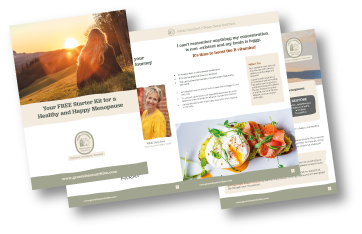
As you transition through the menopause, paying attention to your gut health is very important. We are learning more and more about gut health and the impact it has on our general health. And research continues to emerge on how looking after your gut can have a positive impact on your menopause experience.
Your gut is home to trillions and trillions of bacteria – often referred to as gut microbiome
And a healthy gut is one that has an incredibly rich diversity of these microbes.
Your own microbiome will change throughout your life. It can be impacted by:
- Your environment
- Stress levels
- Use of medications such as anti-biotics and non-steroidal anti inflammatories
And your gut health and microbiome can also be impacted by your menopause and a change in your sex hormone levels.
Although this is a fairly new area of research, evidence is showing that those with a healthy gut microbiome experience a better menopause transition. And that the severity of menopausal symptoms may be closely related to your gut health.
An imbalance in your gut bacteria may contribute to some of the following common menopause symptoms:
- Digestive issues such as bloating, constipation and acid reflux
- Hot flushes
- Low mood
- Lack of energy
- Weight gain
So, why is this?
Although research is fairly new, this is what we know: Fluctuating and declining levels of oestrogen influence the gut microbiome and vice versa. In fact, there is a bidirectional relationship between oestrogen and gut health
In addition to looking after your reproductive health, oestrogen has other important roles in our body:
- It feeds your healthy bacteria and allows it to flourish
- Maintains your gut lining and keeps it strong
- Reduces inflammation in your body
- Regulates your stress hormone cortisol
So, let’s have a look at these in more detail:
1. Oestrogen has a role in increasing your beneficial bacteria diversity.
And so, when oestrogen levels decline, the diversity decreases. And this reduction is enough to create an unfavourable environment in the gut. When your friendly bacteria reduce, bad pathogenic bacteria are able to flourish instead. Your ability to digest and absorb nutrients decreases. Things like constipation become common. In addition, it promotes low grade chronic inflammation and reduced insulin sensitivity. This increases the risk of gaining weight. Furthermore, a lack of oestrogen can damage the gut lining. And this can also cause weight gain.
2. Oestrogen regulates your stress hormone cortisol.
When oestrogen levels decline, it can no longer regulate your cortisol levels. If this stress hormone is left unchecked, cortisol levels can increase. This in turn slows down digestion. When you are constantly in a “fight and flight” mode, the digestion of food is no longer a priority. This function is “switched off”. And of course, if you are not digesting food properly, you may experience symptoms such as bloating, constipation and acid reflux.
3. Reduced microbiome diversity and abundance can cause night sweats, hot flushes and mood swings.
The link between your gut microbiome and hot flushes may not be obvious at first, but there is a link for sure. And increasing strains of beneficial bacteria have been shown to improve symptoms such as nigh sweats, hot flushes and mood swings.
The gut-brain axis describes the nervous system which connects your brain and digestive system. It’s a two- way communication system. And it needs to be working well for your overall health. If your gut bacteria are not balanced and harmful bacteria is allowed to dominate, your body will struggle. You will not be able to support a healthy metabolism. And unwanted hormones may start to recirculate around your body. This is not good news. When this happens, typical menopausal symptoms may appear. These include hot flushes, night sweats and mood swings.
So, you can see that adopting a healthy diet and lifestyle can be hugely beneficial for your gut and hormonal health.
Here is how to promote a healthy balance of beneficial gut bacteria:
- Make sure you include lots of prebiotics in your diet. This is food for the friendly bacteria and allows them to flourish. Prebiotic foods include garlic, onions, asparagus, chicory, ginger, cabbage, fennel, beetroot, bananas, blueberries and apples.
- Increase your intake of fermented foods such as live yoghurt, sauerkraut. Kimchi, kefir and kombucha. This will increase the number and diversity of friendly bacteria.
- Focus on foods that re balance your hormones. Phytoestrogens mimic oestrogen and in doing so regulate and restore your hormone levels. Good foods to include are tofu, tempeh, miso as well as beans, pulses and legumes.
- Eat healthy fats such as avocados, nuts, oily fish and olive oil. This will encourage good bacteria in the gut to grow and flourish. Bad fats will do the opposite and increase inflammation. They promote the growth of bad bugs and create resistance to weight loss.
- Eat foods that contain lots of B vitamins. Good examples are oats, barley and brown rice. These will give you energy. They will help manage stress levels. And they help to keep your digestive system functioning well.
- Include lots of fibre in your diet. Fruit and vegetables are great sources. This will help your liver to detoxify and remove excess oestrogen from re circulating around your body.
- Avoid the not-so-gut friendly foods. These are refined carbohydrates, processed foods and sugar. These are the type of foods that allow the bad guys to thrive.
The bottom line
A healthy gut really does matter. There are so many roles for it to perform. It digests food and produces vitamins. It regulates hormones and gets rid of waste from your body. And of course, now you see that there is a connection between your gut and how well you transition through the menopause. So, it’s worth focusing on your gut bacteria: It needs to be in balance for you to be healthy.
If you are interested in supporting your menopause naturally, why not download my free starter kit for a happy and healthy menopause here?

